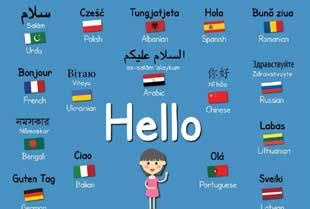
2 minute read
English as an Additional Language
English as an Additional Language (EAL) classes can be offered to pupils whose first language is not English or whose previous educational work has not been in English. It is also recommended for pupils who have been in the Intensive English programme in Year 9.
The pupils follow a language programme designed to build their skills in reading, writing, listening and speaking English. Pupils are prepared for entry in the IGCSE “English as a Second Language” examination. The exam assesses pupils from intermediate to advanced level.
The course aims to develop: • an understanding of a variety of texts • an understanding of standard spoken English, live or broadcast, on familiar and unfamiliar topics • the ability to write clear, well-structured texts using an appropriate style • the ability to express themselves fluently, spontaneously and appropriately in a variety of contexts
• the skills necessary for further study or employment, either in English-speaking countries or where English is used as the main medium of communication for business and commerce
• an understanding of the nature of language in different cultural contexts
What will I study?
Pupils will follow a course based on the Macmillan textbook “Gateway B2”. This gives the students the opportunity to study a range of grammar and vocabulary as well as a variety of topics related to both home and school life and the wider world.
Topics include: • Life at university • The world of work
• Space and space travel • Human intelligence • Money and banking • The body and health • Music, film and media
• Natural disasters
• Technology • Newspapers
How will I be assessed?
The final grade (from 9-1) is awarded based on two single-tier papers that are assessed externally.
Key Stage 4 Guide


Paper 1 662/3% of final grade 2 hour exam Paper 2 331/3% of final grade 50 minute exam
Reading:
Students must be able to: • read in different ways for different purposes • read and understand a range of materials used for informational or publicity purposes • read and understand a range of unseen texts, identifying overall themes • read and understand a range of short opinion pieces and identify the writer’s viewpoint • read and understand a range of popular articles on a variety of factual, historical, geographical and technical themes
Writing:
Students must be able to: • write for a variety of audiences • write in a variety of styles from informal to formal • write for a range of purposes • write on a range of topics such as education, family, health, travel, technology and climate • write using a wide range of grammatical forms and structures • write using a wide range of relevant and appropriate vocabulary • summarise longer passages of text by selecting relevant information and paraphrasing it without copying verbatim
Listening:
Students must be able to: • listen to and understand short extracts and identify the item, place or event which the speaker is describing • listen to and understand informational broadcasts such as extracts from radio programmes or podcasts • listen to and understand conversations, which may be casual or in the form of interviews • listen to and understand academic lectures on general interest topics, identifying facts and viewpoints which may include some degree of specialist, technical or complex vocabulary










